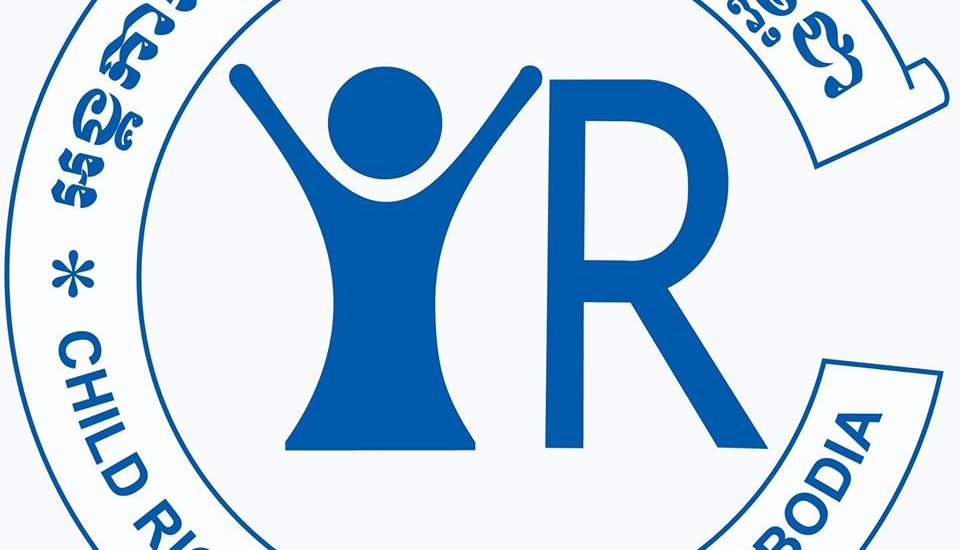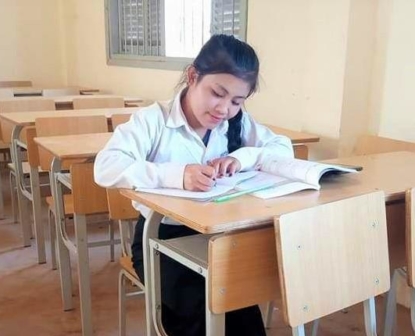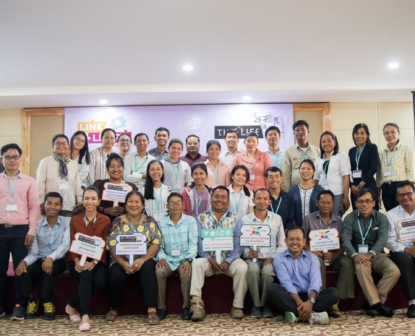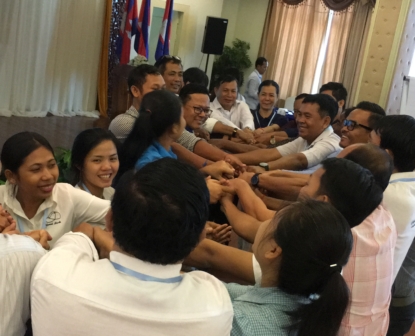Project
Ending Child Marriage in Ratanak Kiri
-
Amount Funded
191,588 EUROProject Duration
01 Feb 2019 - 31 Dec 2020 -
-
Lead organisation
Partners
Non-Timber Forest Products (NTFP) and Child Helpline Cambodia (CHC)
-
Child Rights Coalition Cambodia (CRC Cambodia), formerly known as NGO Coalition on the Rights of the Child Cambodia, is an alliance of national and international non-government organisations. It was registered with Ministry of Interior as Non-Governmental Organisations under Prakas 1016 P on 10th June 2018. CRC Cambodia advocates for child rights and ensures support for the UN Convention on the Rights of the Child through monitoring its implementation, cooperating with member organisations, and networking with relevant agencies. It dedicates its efforts and resources to the efficient and effective implementation of the Convention by advocating for child rights. Specifically, it concentrates on the formulation and amendment of laws pertaining to children. For this project, CRC Cambodia is the host while Non-Timber Forest Products (NTFP) and Child Helpline Cambodia (CHC) are its partners.
-
Organisation
Child Rights Coalition Cambodia (CRC Cambodia), formerly known as NGO Coalition on the Rights of the Child Cambodia, is an alliance of national and international non-government organisations. It was registered with Ministry of Interior as Non-Governmental Organisations under Prakas 1016 P on 10th June 2018. CRC Cambodia advocates for child rights and ensures support for the UN Convention on the Rights of the Child through monitoring its implementation, cooperating with member organisations, and networking with relevant agencies. It dedicates its efforts and resources to the efficient and effective implementation of the Convention by advocating for child rights. Specifically, it concentrates on the formulation and amendment of laws pertaining to children. For this project, CRC Cambodia is the host while Non-Timber Forest Products (NTFP) and Child Helpline Cambodia (CHC) are its partners.
-
Project
Ending Child Marriage in Ratanak Kiri province project empowers indigenous adolescents and girls to fully enjoy their childhood. The project works to ensure that young adults have access to services that improve their safety, health, education, and wellbeing. This project specifically targets and works with indigenous and/or ethnic minority adolescents and teenagers, who are at risk of child marriage, teenage pregnancy, sexual and gender-based violence. The project is reducing the traditional practice of marrying off children before 18 years old; eliminating the practice of child marriage. The project also focuses on Child Sensitivity Reporting and Response Mechanism (CRRM) which functions 24/7 to support indigenous and/or ethnic minority adolescents, teens, parents, and communities to report sexual violence, abuse, exploitation and access counselling, and psycho-social support services.
-
-
Ending Child Marriage in Ratanak Kiri province project empowers indigenous adolescents and girls to fully enjoy their childhood. The project works to ensure that young adults have access to services that improve their safety, health, education, and wellbeing. This project specifically targets and works with indigenous and/or ethnic minority adolescents and teenagers, who are at risk of child marriage, teenage pregnancy, sexual and gender-based violence. The project is reducing the traditional practice of marrying off children before 18 years old; eliminating the practice of child marriage. The project also focuses on Child Sensitivity Reporting and Response Mechanism (CRRM) which functions 24/7 to support indigenous and/or ethnic minority adolescents, teens, parents, and communities to report sexual violence, abuse, exploitation and access counselling, and psycho-social support services.
-
“By joining the project activity of peer to peer education, join with health post for providing mobile health services to young mother… I have changed myself from getting marriage at a young age or living in poor family conditions, but I want to get higher education.”_ Said Miss Chae Chhean, Girl-Led Group members from Voeun Sai district
- The project consortium actively supported the Provincial Women’s and Children’s Consultative Committee (PWCCC) to implement the Provincial Action Plan to Prevent Child Marriage and Teenage Pregnancy in Ratanakiri. Key influencing actors and rights holders in Ratanakiri Province have been enabled to lead advocacy efforts at the community, sub-national, and national levels to promote actions that can prevent, respond to, and provide comprehensive public services to indigenous adolescents, especially girls, affected by early/child marriage and Sexual and Gender-Based Violence (SGBV), including direct engagement with policymakers.
- The Ratanakiri Provincial Governor has integrated indicators of child marriage and teenage pregnancy into their Provincial Investment Plan 2021 and developed a joint statement with the CRC-Cambodia for submission to the 1st, 7th, and 8th Commissions of the National Assembly of Cambodia.
- Three Joint Statements were submitted to the 1st, 7th, and 8th Commission of the National Assembly of Cambodia.
- 2 posters on mapping and IEC materials are printed and distributed to indigenous community and stakeholders
- 5 short video clips are produced for broadcasting via social media and TV channels.
- 58 focal points for CRRM (Child sensitivity Reporting and Response Mechanism) were selected to support project implementation.
- The counseling staff visited 209 households and nine times to provide counseling and educational service to indigenous adolescents, girls, young mothers, and families who are at risk and affected by child marriage and teenage pregnancy were received home visit counseling by frontline counselors.
- 540 (271 female/girl) from Ratanakiri Province have called to the free operating helpline service 24h/7d, through 1280 from the helpline call.
- 37 mobile health service sessions were organized to support indigenous adolescents, girls, young mothers, and families who were affected by child marriage.
- 23 times mobile video shows were conducted for 2232 (677 women, 661 men, 475 girls, 419 boys) indigenous people in target intervention in Ratanakiri Province to promote community members, children, women, adolescents, girls, and families to be aware of consequences of child marriage and child right abuse, especially, take a part in the prevention and stop early/child marriage.
- 229 (141 men, 139 females, five boys, and 14 girls) including child-club, girl-led, elder, and CWCC attended 20 village/commune meetings.
- Community performance on the consequence of child marriage in 13 different target areas.
- 102 ( 29 women) in target intervention of elder and religious leaders were identified to promote related laws in child protection, marriage, and family law to their community.
- Awareness-raising campaigns on Positive Parenting Concepts were organized in 9 communes, in 11 different places on positive parenting’s roles and responsibility, the approach of surviving their child and children duties to their parents.
- 17 child clubs and 18 girl-led groups with 90 members girl-led structure were formed to promote the negative effect of early/child marriage and influence to authorities and can raise concern in the meeting and organize awareness campaign.
- 3 parent model champions are selected at district level 1 for each district and selected 3 times.
Publications:
- Coming to our voices: Meet the two young drivers of change in Cambodia https://voice.global/blog/coming-to-our-voices/
- Making our voice loader! https://voice.global/blog/making-our-voices-louder/
- Work harder, Voice loader! https://voice.global/blog/work-harder-voice-louder/
Video publication:
- The Model Family: https://www.facebook.com/mowa.gov.kh/videos/535553296997074
- The Young Mother: https://www.facebook.com/mowa.gov.kh/videos/3919890171384486
- Child Marriage is prone to domestic violence: https://www.facebook.com/mowa.gov.kh/videos/228949855027007
- Sickness (due to child marriage): https://www.facebook.com/mowa.gov.kh/videos/1953524158124746
- Katin’s Life story: https://www.facebook.com/mowa.gov.kh/videos/1094703020902808
Poster:
- Say No to child marriage: https://www.facebook.com/chc1280/photos/a.187452911329829/3551694134905673/
xxx
Ending child marriage in Ratanakiri: Community-level intervention and institutional support
In Ratanakiri province, indigenous adolescents, especially girls, are affected by early/child marriage and Sexual and Gender-Based Violence (SGBV). The marginalisation of their communities means that they lack counselling and educational services and are hence unaware of the consequences of child marriage and child right abuse. This handicap means that they cannot take a part in the prevention of early/child marriage and teenage pregnancy.
The CRC-Cambodia project consortium actively supported the Provincial Women’s and Children’s Consultative Committee (PWCCC) to implement the “Provincial Action Plan to Prevent Child Marriage and Teenage Pregnancy in Ratanakiri”. Key influencing actors and rightsholders in Ratanakiri have been enabled to lead advocacy efforts at the community, sub-national, and national levels to promote actions that can prevent, respond to, and provide comprehensive public services to indigenous adolescents, especially girls, affected by early/child marriage and Sexual and Gender-Based Violence (SGBV). These efforts included direct engagement with policymakers as well as counselling and educational service to indigenous adolescents, girls, young mothers, and families who are at risk of being affected by child marriage and teenage pregnancy.
By engaging youth in peer-to-peer activities, not only did the project keep individual girls from early marriage, it also encouraged in them a voice of reason who can influence their peers:
“By joining the project activity of peer-to-peer education with a health post for providing mobile health services to young mothers… I have saved myself from getting married at a young age or living in poor family conditions. Now, I want to get higher education.” – Ms. Chae Chhean, girl-led group member from Voeun Sai district.
Multiple approaches were employed to reach indigenous communities:
- To raise awareness, two posters on mapping and other IEC materials were printed and distributed to indigenous communities and stakeholders. Furthermore, 5 short video clips were produced for broadcasting via social media and TV channels.
- Interpersonal communication efforts saw counselling staff visit 209 households 9 times, while indigenous young women were offered a line to reach out to the counsellors. The toll-free helpline service was available 24 hours for 7 days a week. It received calls from 540 (271 female) people from Ratanakiri and reached out to 1280 with helpline calls.
- Community-level support was provided with 58 focal points for CRRM (Child-sensitivity Reporting and Response Mechanism) selected to support project implementation and 37 mobile health service sessions organised to support indigenous adolescents, girls, young mothers, and families who were affected by child marriage.
- To build community awareness and dialogue about the issue, community performances on the consequence of child marriage were staged in 13 different locations. Furthermore, mobile video shows were conducted 23 times for 2232 (1152 women and girls) people in Ratanakiri to promote awareness about consequences of child marriage and child rights abuse and to mobilise community members, children, women, adolescents, girls, and families to take a part in the prevention and stop early/child marriage.
- 17 child clubs and 18 girl-led groups with 90-members were formed to promote awareness about the effects of early/child marriage, to influence authorities, to raise concerns in meetings, and to organise awareness campaigns.
- Elders and religious leaders were identified to promote related laws in child protection, marriage, and family law to their communities.
- Awareness-raising campaigns on positive parenting concepts, roles and responsibilities were organised in 9 communes, with 3 parent model champions selected (1 for each district).
The Ratanakiri Provincial Governor integrated indicators of child marriage and teenage pregnancy into the Provincial Investment Plan 2021 and developed a joint statement with CRC-Cambodia for submission to the 1st, 7th, and 8th Commissions of the National Assembly of Cambodia. 3 Joint Statements were submitted to the 1st, 7th, and 8th Commission of the National Assembly of Cambodia.
Publications:
- “Coming to our voices: Meet the two young drivers of change in Cambodia”: https://voice.global/blog/coming-to-our-voices/
- “Making our voice loader!”: https://voice.global/blog/making-our-voices-louder/
- “Work harder, voice loader!”: https://voice.global/blog/work-harder-voice-louder/
Video publications:
- Educational video on child marriage: https://oxfam.app.box.com/file/712799879202
- Story performers at community: https://oxfam.app.box.com/file/712546169309
- Mobile video show: https://oxfam.app.box.com/file/712547518998
- “The Model Family”: https://www.facebook.com/mowa.gov.kh/videos/535553296997074
- “The Young Mother”: https://www.facebook.com/mowa.gov.kh/videos/3919890171384486
- “Child marriage is prone to domestic violence”: https://www.facebook.com/mowa.gov.kh/videos/228949855027007
- “Sickness due to child marriage”: https://www.facebook.com/mowa.gov.kh/videos/1953524158124746
- “Katin’s life story”: https://www.facebook.com/mowa.gov.kh/videos/1094703020902808
Poster:
- “Say No to child marriage”: https://www.facebook.com/chc1280/photos/a.187452911329829/3551694134905673/
Case studies:
- “Bopha and Beb Nai”: https://oxfam.app.box.com/file/731962438878
- “Better feeling of child-mother from household counselling”: https://oxfam.app.box.com/file/731959623200
- “Youth to end child marriage and teenage pregnancy”: https://oxfam.app.box.com/file/731961134837
- News






